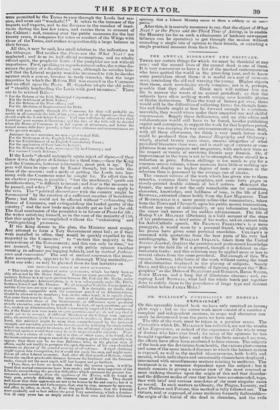THE ANNUAL BIOGRAPHY AND OBITUARY..
THERE are certain things for which we must be thankful at any rate ; and the annual lives of the annual dead is one of them. It is very convenient to have a list of the marked contemporaries who have quitted the world in the preceding year, and to know some particulars about them; it is useful as a sort of memento mori, reminding the old and warning the young. Higher objects than these, such necrolo4ies rarely compass; nor is it, perhaps, possible that they should. Great men will neither live nor die to answer the wants of an annual periodical; S3 that the subjects have often nothiog worth noting; save heraldic glories or titular distinctions. Were the want of heroes got over, there would still be the dillicultiesof collecting facts; for, though fami- lies and friends might at first be forward enough to centribute materials, they would wince under their impartial Use and skilful compression. Supply these deficiencies, and an able editor and collaborateurs would still have to be found, besides publishing capital and enterprise, to support the work for that hopeless period, whilst it was creeping its way into remunerating circulation. Still, with all these allowances, we think a very much better work could be produced than the Annual Rio:traphy and Obituary ; which, started twenty years siace, smacks altogether of what periodical literature then was: and is made up of extracts or com- pilations from newspapers and magazines, with such new lives as the respect or vanity of surviving friends may furnish. Or, if improvement in the ware is not to be attempted, there should be a reduction in price. Fifteen shillings is too much to pay for a common octavo volume, whose contents have little or nothing ori- ginal, and display no higher degree of taste or acumen in the selection than is possessed by the average run of clerks.
The current volume of the work which has given rise ta these remarks, contains thirty biographies, and some forty pages in closely-printed double column of' brief notices. amongst the former, the most if not the only remarkable one for animation, character, knowledge, and boldness of tone, is the life of Lord STOWELL, extracted almost bodily from the Law Magazine. That of ROTHSCHILD is a mere penny-a-line-like commentary, taken from the Times and Chronicle, upon his public money transactions, without any traits of individuality, or any information touching the cause and means of his sudden advancement. The life of Bishop VAN MILDERT (Durham) is a bald account of the steps of his preferment, a brief notice of his works, and an extract from his Anti-Catholic speech. Sir FRANCIS FREELING'S is a mere panegyric, it would seem by a personal friend, who might with his praise have given some personal anecdotes. COLM,AN'S is crammed with quotations from the best parts of his very bad autobiography. Sir WILLIAM INGLIS'S, taken from the United Service Journal, displays the precision and professional knowledge
proper to the field life of a general, though it is deficient in cha- racteristic traits: and this criticism may be applied more or less to several others from the same periodical. But enough of this. We cannot, however, take leave of the work without noting the want of discrimination displayed in the placing of subjects. Surely GELL and GiLuEs were as worthy of figuring amongst the " Bio-
graphies" as the Dukes of BeauFoar and GORDON, Baron SMITH, JOHN MAYNE. and a long list of illustrious obscure ; and, ex- cepting Lord SrowELL, what had time whole batch put together done to entitle them to the precedence of large type and distinct exhibition before JAMES MILL:


























 Previous page
Previous page